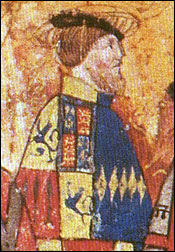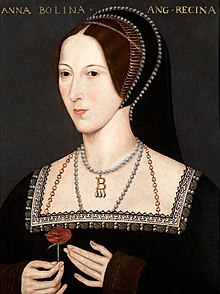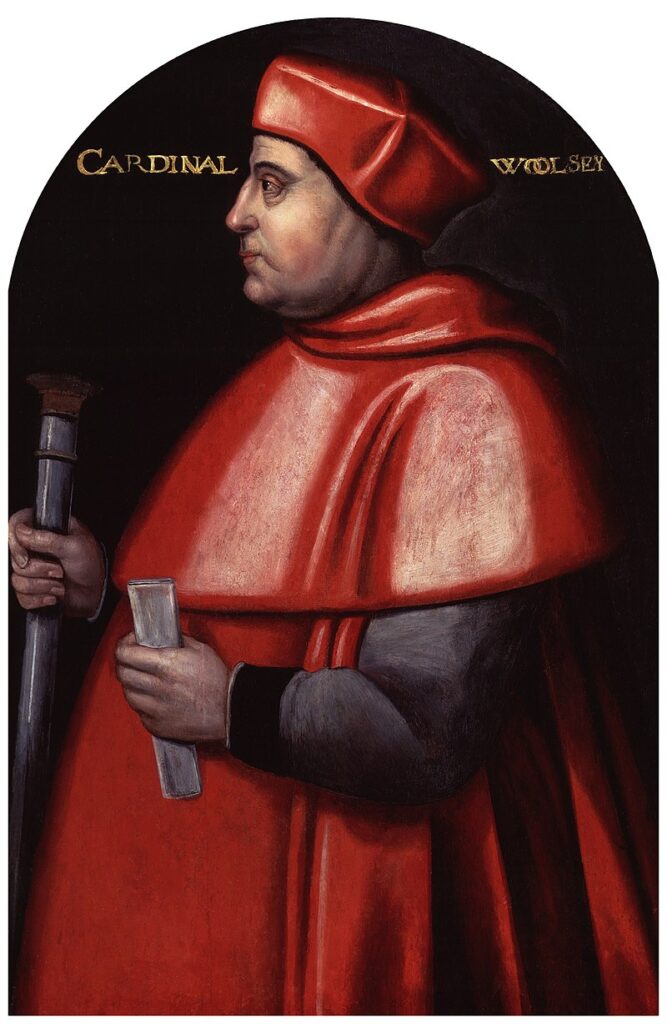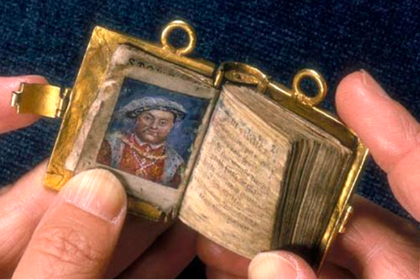On this day, the 13th of May, in 1536, Henry Percy, 6th Earl of Northumberland, denied having married Anne Boleyn:
Northumberland to Cromwell
‘I perceive by Raynold Carnaby that there is supposed a pre-contract between the Queen and me; whereupon I was not only heretofore examined upon my oath before the archbishops of Canterbury and York, but also received the blessed sacrament upon the same before the duke of Norfolk and other the King’s highness’ council learned in the spiritual law, assuring you, Mr. Secretary, by the said oath and blessed body, which afore I received and hereafter intend to receive, that the same may be to my damnation if ever there were any contract or promise of marriage between her and me.’


Though we do not have any further records regarding the ‘examination’ that Percy underwent nor the ‘oaths’ he was compelled to make, it is possible that this was the angle that Cromwell and the King originally intended to take in Anne’s downfall. On the 2nd May, Chapuys’ letter to Charles V implies that the matter had been under investigation for some time:
Chapuys to Charles, 2nd May
‘…even if the said crime of adultery had not been discovered, this King, as I have been for some days informed by good authority, had determined to abandon her; for there were witnesses testifying that a marriage passed nine years before had been made and fully consummated between her and the earl of Northumberland, and the King would have declared himself earlier, but that some one of his Council gave him to understand that he could not separate from the Concubine without tacitly confirming, not only the first marriage, but also, what he most fears, the authority of the Pope.’
In the face of Percy’s stout denial, and the lack of corroborating evidence, this line of enquiry was dropped; the Percys of Northumberland were incredibly powerful, and moving against them would have risked destabilising England’s northern border with Scotland.

No further contemporary evidence regarding the matter has survived–there is certainly no suggestion of it in source from the mid 1520s when the marriage supposedly took place–so it is difficult to know what truly took place. However, in the 1550s, one of Cardinal Wolsey’s former gentlemen-ushers, George Cavendish, wrote a biography of his former master. In it, he relates what occurred between Anne and Percy, as well as Wolsey’s role in it. Cavendish would have been ideally placed to know what happened; however, different standards of history and biography applied during the 16th century, and he was writing three decades after the fact, so it is difficult to know just how much his account should be relied upon.
But likewise, we cannot trust Percy’s denials – he was protecting himself, and possibly even trying to protect Anne. Somewhere in between Percy’s avowals and Cavendish’s romanticisation lies the truth.

From ‘The Life and Death of Cardinal Wolsey’ by George Cavendish
‘In so much [as] my Lord Percy, the son and heir of the Earl of Northumberland, then attended upon the Lord Cardinal, and was also his servitor; and when it chanced the Lord Cardinal at any time to repair to the court, the Lord Percy would then resort for his pastime unto the queen’s chamber, and there would fall in dalliance among the queen’s maidens, being at the last more conversant with Mistress Anne Boleyn than with any other; so that there grew such a secret love between them that, at length, they were insured together, intending to marry.
The which thing came to the king’s knowledge, who was then much offended. Wherefore he could hide no longer his secret affection, but revealed his secret intendment unto my Lord Cardinal in that behalf; and consulted with him to infringe the precontract between them: insomuch, that after my Lord Cardinal was departed from the court, and returned home to his place at Westminster, not forgetting the king’s request and counsel, being in his gallery, called there before him the said Lord Percy unto his presence, and before us his servants of his chamber, saying thus unto him.
“I marvel not a little,” quoth he, “of thy peevish folly, that thou wouldest tangle and ensure thyself with a foolish girl yonder in the court, I mean Anne Boleyn. Dost thou not consider the estate that God hath called thee unto in this world? For after the death of thy noble father, thou art most like to inherit and possess one of the most worthiest earldoms of this realm. Therefore it had been most meet, and convenient for thee, to have sued for the consent of thy father in that behalf, and to have also made the king’s highness privy thereto; requiring therein his princely favour, submitting all thy whole proceeding in all such matters unto his highness, who would not only accept thankfully your submission, but would, I assure thee, provide so for your purpose therein, that he would advance you much more nobly, and have matched you according to your estate and honour, whereby ye might have grown so by your wisdom and honourable behaviour into the king’s high estimation, that it should have been much to your increase of honour. But now behold what ye have done through your wilfulness. Ye have not only offended your natural father, but also your most gracious sovereign lord, and matched yourself with one, such as neither the king, ne yet your father will be agreeable with the matter. And hereof I put you out of doubt, that I will send for your father, and at his coming, he shall either break this unadvised contract, or else disinherit thee for ever. The king’s majesty himself will complain to thy father on thee, and require no less at his hand than I have said; whose highness intended to have preferred [Anne Boleyn] unto another person, with whom the king hath travelled already, and being almost at a point with the same person, although she knoweth it not, yet hath the king, most like a politic and prudent prince, conveyed the matter in such sort, that she, upon the king’s motion, will be (I doubt not) right glad and agreeable to the same.”
“Sir,” (quoth the Lord Percy, all weeping), “I knew nothing of the king’s pleasure therein, for whose displeasure I am very sorry. I considered that I was of good years, and thought myself sufficient to provide me of a convenient wife, whereas my fancy served me best, not doubting but that my lord my father would have been right well persuaded. And though she be a simple maid, and having but a knight to her father, yet is she descended of right noble parentage. As by her mother she is nigh of the Norfolk blood: and of her father’s side lineally descended of the Earl of Ormond, he being one of the earl’s heirs general. Why should I then, sir, be any thing scrupulous to match with her, whose estate of descent is equivalent with mine when I shall be in most dignity? Therefore I most humbly require your grace of your especial favour herein; and also to entreat the king’s most royal majesty most lowly on my behalf for his princely benevolence in this matter, the which I cannot deny or forsake.”
“Lo, sirs,” quoth the cardinal, “ye may see what conformity and wisdom is in this wilful boy’s head. I thought that when thou heardest me declare the king’s intended pleasure and travail herein, thou wouldest have relented and wholly submitted thyself, and all thy wilful and unadvised fact, to the king’s royal will and prudent pleasure, to be fully disposed and ordered by his grace’s disposition, as his highness should seem good.” “Sir, so I would,” quoth the Lord Percy, “but in this matter I have gone so far, before many so worthy witnesses, that I know not how to avoid my self nor to discharge my conscience.” “Why, thinkest thou,” quoth the cardinal, “that the king and I know not what we have to do in as weighty a matter as this? Yes (quoth he), I warrant thee. Howbeit I can see in thee no submission to the purpose.” “Forsooth, my Lord,” quoth the Lord Percy, “if it please your grace, I will submit myself wholly unto the king’s majesty and [your] grace in this matter, my conscience being discharged of the weighty burthen of my precontract.” “Well then,” quoth the cardinal, “I will send for your father out of the north parts, and he and we shall take such order for the avoiding of this thy hasty folly as shall be by the king thought most expedient. And in the mean season I charge thee, and in the king’s name command thee, that thou presume not once to resort into her company, as thou intendest to avoid the king’s high indignation.” And this said he rose up and went into his chamber.
Then was the Earl of Northumberland sent for in all haste, in the king’s name, who upon knowledge of the king’s pleasure made quick speed to the court. And at his first coming out of the north he made his first repair unto my Lord Cardinal, at whose mouth he was advertised of the cause of his hasty sending for; being in my Lord Cardinal’s gallery with him in secret communication a long while. And after their long talk my Lord Cardinal called for a cup of wine, and drinking together they brake up, and so departed the earl, upon whom we were commanded to wait to convey him to his servants. And in his going away, when he came to the gallery’s end, he sat him down upon a form that stood there for the waiters some time to take their ease. And being there set called his son the Lord Percy unto him, and said in our presence thus in effect. “Son,” quoth he, “thou hast always been a proud, presumptuous, disdainful, and a very unthrift waster, and even so hast thou now declared thyself. Therefore what joy, what comfort, what pleasure or solace should I conceive in thee, that thus without discretion and advisement hast misused thyself, having no manner of regard to me thy natural father, ne in especial unto thy sovereign lord, to whom all honest and loyal subjects bear faithful and humble obedience; ne yet to the wealth of thine own estate, but hast so unadvisedly ensured thyself to her, for whom thou hast purchased thee the king’s displeasure, intolerable for any subject to sustain! But that his grace of his mere wisdom doth consider the lightness of thy head, and wilful qualities of thy person, his displeasure and indignation were sufficient to cast me and all my posterity into utter subversion and dissolution: but he being my especial and singular good lord and favourable prince, and my Lord Cardinal my good lord hath and doth clearly excuse me in thy lewd fact, and doth rather lament thy lightness than malign the same; and hath devised an order to be taken for thee; to whom both thou and I be more bound than we be able well to consider. I pray to God that this may be to thee a sufficient monition and warning to use thyself more wittier hereafter; for thus I assure thee, if thou dost not amend thy prodigality, thou wilt be the last earl of our house. For of thy natural inclination thou art disposed to be wasteful prodigal, and to consume all that thy progenitors have with great travail gathered together and kept with honour. But having the king’s majesty my singular good and gracious lord, I intend (God willing) so to dispose my succession, that ye shall consume thereof but a little. For I do not purpose, I assure thee, to make thee mine heir; for, praises be to God, I have more choice of boys who, I trust, will prove themselves much better, and use them more like unto nobility, among whom I will choose and take the best and most likeliest to succeed me. Now, masters and good gentlemen,” (quoth he unto us), “it may be your chances hereafter, when I am dead, to see the proof of these things that I have spoken to my son prove as true as I have spoken them. Yet in the mean season I desire you all to be his friends, and to tell him his fault when he doth amiss, wherein ye shall show yourselves to be much his friends.” And with that he took his leave of us. And said to his son thus: “Go your ways, and attend upon my lord’s grace your master, and see that you do your duty.” And so departed, and went his way down through the hall into his barge.
Then after long debating and consultation upon the Lord Percy’s assurance, it was devised that the same should be infringed and dissolved, and that the Lord Percy should marry with one of the Earl of Shrewsbury’s daughters; (as he did after); by means whereof the former contract was clearly undone.’





